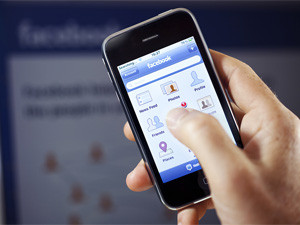
While Facebook does not widely share the statistics on its mobile users apart from overall numbers, an independent technology analyst has compiled a detailed breakdown of Facebook's mobile user base for the first time.
The numbers compiled by Benedict Evans of Enders Analysis show that while iOS is currently the biggest platform for Facebook's mobile app, Android is showing the fastest growth rate and will soon become the most important platform for the social network.
Evans says Facebook used to quietly publish its mobile user statistics until late last year. In a blog post detailing his analysis of the data, Evans says: "I was always slightly nervous of publishing it, since you had to know how to get it and I suspected it might disappear if anyone pointed it out. Now, like fairy gold, the data has disappeared, so I can share it."
Mobile as a whole is a major priority for Facebook since 604 million of its 1.07 billion users are mobile users, with 470 million of those accessing the social network via a smartphone application. A total of 134 million users access Facebook solely via the mobile Web.
According to Evans' numbers (as of September 2012) Facebook had 140 million iPhone users and 45 million iPad users. Android follows with 175 million users in total. The BlackBerry platform had less than 60 million Facebook app users.
By comparing the data from 2011 with 2012, Evans says it is easy to see that Facebook's mobile growth is primarily coming from Android, which is up from 66 million to 175 million. Growth among iPhone users is up from 91 million to 140 million.
"There is also very interesting strength for the J2ME client for feature phones, which is probably a function of growth in emerging markets: this app more than doubled to 75 million users," says Evans. "The RIM app is growing much more slowly (and had flattened completely by the time the data stopped being reported) and Windows and Nokia are nowhere."
Evans emphasises the data is not exclusive and the majority of mobile app users most likely access Facebook via the Web and mobile.
UX focus
In keeping with the trends shown in the data, Facebook has recently begun to focus on improving the experience for Android users. Following the release of the new native iOS Facebook app last year, Facebook reportedly turned its attention to Android, even strongly encouraging all employees to switch to the platform and eat their own dog food.
Facebook's iOS app currently has much higher penetration than its Android counterpart. According to Evans, 70% of iPhone users use the Facebook app, compared to 40% of Android users.
Evans says the higher penetration on iOS might be a "geographic issue".
"With Android having higher share in emerging markets with lower Facebook use, but it probably also reflects the widely observed lower engagement on Android. There may also be app quality issues."
Evans adds: "Facebook is becoming a mobile app-based service first and foremost. Almost half the base is using smartphone apps and we can be sure it's more than half the use, especially in developed markets, where 75% of users are on mobile in some form."
The two key challenges ahead for Facebook, according to Evans, are monetising mobile and perfecting the user experience (UX).
"Facebook has nailed a certain vision of desktop social networking. It is much less clear to me that it has nailed the 'One True Mobile' social experience. Hence Instagram, Poke, Camera, Messenger - Facebook is back into customer discovery mode, trying to work out the right UX."
Evans' detailed analysis of the data can be viewed here.
Share